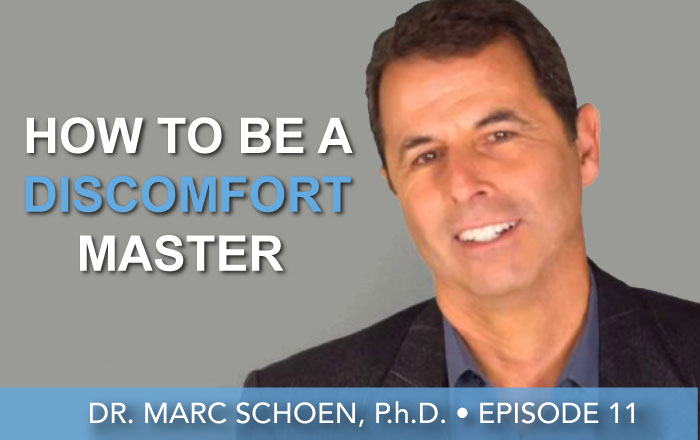Episode 11 | Dr. Marc Schoen, P.h.D. | How To Become A Discomfort Master

Why you should listen –
Are you comfortable in the face of discomfort, or do you unravel under pressure?
The feelings that arise when you’re on a deadline at work, giving a presentation, or stuck in traffic can set off a stress response. Even that social anxiety you may feel when you walk into a situation when there’s not a familiar face in the room can trigger your natural, instinctual reaction to fight, flight or freeze.
These responses create a chain reaction in your body. Your stomach starts to tighten, blood pressure increases, eyes dilate, and breathing accelerates. Add to that the uncontrolled thoughts of failure and embarrassment, and you’re a basket case in the making. And, it impacts your performance AND health.
You might think that feeling uncomfortable without hitting the fear button is impossible, but in today’s eye-opening interview with Dr. Marc Schoen, P.h.D., we’re delving into practical ways to build up your “instinctual muscles” to weather stress and manage discomfort.
I had the privilege of meeting Marc in LA, where he’s the Assistant Clinical Professor at UCLA’s Geffen School of Medicine where he specializes in Boosting Performance and Decision Making Under Pressure. His work has been featured in Los Angeles Times, Wall Street Journal, Oprah, WebMD, Fortune Magazine, and many others. Marc has worked extensively with elite athletes, and with top executives helping them strengthen their ability to THRIVE in discomfort.
Marc has an interesting method to retrain your brain and conquer fear…called Discomfort Training. This technique helps build heartiness and resilience by re-wiring the fear center of the brain which is responsible for your performance under pressure.
This episode is a MUST-LISTEN if you tend to crack under pressure, or feel anxiety before an event. It can transform the way you live. You will learn PRACTICAL ways to:
- Break up with stress
- Improve performance…in business, athletics, and life.
- Physically alter the brain’s fear center
- Release anxiety before a deadline, social event, or performance
LISTEN…CLICK PLAY!
Follow Along With The Highlights Of The Show
I don’t want listeners to think you have to be an elite athlete or top executive to feel this kind of pressure! Start by explaining discomfort training.
We live in a world that’s become very technically advanced with the theoretical end result of being much more comfortable for people. But paradoxically, we have become less tolerant of being uncomfortable — we’ve become far more sensitive to discomfort in our lives. This sensitivity is activating our survival instinct and leading us to overreact with fear, stress and anxiety in situations that don’t merit those reactions (as the survival instinct was designed for genuine physical stress or threat). We need to retrain our ability to manage discomfort so that it is much less of a threat.
Walk me through an example: I am going to be talking to 300 people. I’m backstage and I start to feel my heart race, I’m perspiring, my stomach tightens thinking about presenting onstage. How would discomfort training look here?
There are essentially two different parts of the brain: the cerebral cortex (the reasoning part of the brain) which works to make sense of the world, and the limbic brain, where our visceral, emotive responses and centers (such as pain, fear, pleasure, anger, etc.) reside. The goal of this part of the brain is to keep us out of danger. It’s looking for any situation in which we may be unsafe. As the limbic brain experiences a situation it believes to be dangerous, a certain level of emotional discomfort happens in our bodies. The more the emotional discomfort increases, the more the limbic brain thinks we are in danger, and the fear response occurs (the racing heartbeat, sweating, and tingling in parts of the body). The logical brain tries to intercept, but it cannot because the limbic brain has a direct connection to our fear reaction in the body (while the cerebral cortex does not). Discomfort training focuses on training the limbic brain to recognize discomfort as non-threatening. In training, we expose people to higher levels of physical and emotional discomfort and train the brain that the body is not in danger.
We do the same thing in fitness. We work on extending the comfort level by taking on a challenge.
We have learned and accept implicitly that we need at least some physical pain to get physical gain. However, we don’t acknowledge this when we feel emotional discomfort — instead, we think we’re in danger.
My daughter is training to go to the Olympics. Something that goes along with her physical training is psychological work to overcome anxiety when she approaches the start line for a race. How do you train elite athletes to manage their anxiety when they face a “boom or bust” performance moment in a matter of a couple minutes?
Here’s a metaphor I like: if you have a fence and the fence is subjected to very strong winds, the fence will fold first at its weakest link. When we’re under physical and emotional pressure, we’re going to buckle in the area that’s our greatest vulnerability. For some, it may be an issue of rejection, or judgement, or low self-esteem. Whatever the vulnerability, one’s Achilles heel is challenged in extreme situations. We cannot change these parts of us, but when this emotional Achilles heel arises, we want to make sure it does not create a fear response in the body. If we’re in a high pressure situation — at the starting line, in your example — those greatest vulnerabilities are going to come up. The mind is wired for negative thoughts (this helped us survive as a species), but we want to change those fear thoughts so they no longer evoke the fear response, but are instead neutralized.
How do you do that?
I bring athletes to sessions in physically uncomfortable states (they arrive very hungry, or physically uncomfortable in a way they would be during their event), and then I push at the Achilles heel. So I create physical discomfort and emotional discomfort, then I condition the discomfort with a very relaxed, comfortable physical state that gets in the way of the fear response. The athletes can then experience physical discomfort and have their emotional state arise, but the fear response doesn’t happen.
Could somebody go through that process on their own by sitting in a meditative state? For example, if someone is working on losing weight and she gets to an uncomfortable state, can she do something on her own?
Not completely; people have been told for years to meditate, take deep breaths, etc., to help manage anxiety, but that alone isn’t enough. We need to go one step further. For example, some people feel when they are really hungry that something bad is going to happen; the hunger brings them to a place of fear. We have to train them when they’re hungry, introduce their fear, then we can pair those feelings with a relaxation response.
I believe that we all want to perform at our best and it all starts with a good night’s sleep. So many people are sleep-deprived right now. In our culture, we feel we need to be alert and attentive 24/7, but this can sabotage the natural rhythms of our bodies. Do you have any suggestions on how to develop a healthy sleep routine?
We condition ourselves to resist our natural rhythms. It’s hard to revive a sleepy feeling we’ve been pushing away all day. We need to train ourselves to start slowing down so that when it’s bedtime, the rhythm is already slower in the body. People may report that they ate dinner, and a couple hours later felt a little sleepy but still had a lot to do, so they pulled out the computer, turned on the tv, and then they lost the sleepy feeling and couldn’t recover it. Plus, if we are revved up and find we’re still able to fall asleep, there’s a decent chance we’re going to awaken in the middle of the night and be unable to fall back to sleep. The sleep chemicals (such as serotonin) that build up in the body have to surpass the stress and energy levels in the body. During the night, if these sleepy chemicals fall below the level of activation in the body, we wake up and are alert. But if we lower our activation level when we go to bed, if we wake up in the middle of the night, the sleepy feeling is greater than the activation level and we fall back asleep.
I’m a big believer in having a bedtime ritual. For me, it’s refraining from using the computer after a certain point, reading a book (even for 15 minutes), taking a hot bath with essential oils, doing a few stretches and sometimes listening to a meditation tape. This ritual allows me to sleep like a baby.
Sadly, a lot of people do not have a bedtime ritual, which creates poor sleep hygiene. This bad hygiene can lead to fear about not being able to sleep, which then prompts a limbic response, and once we’re stirred up by fear it’s very difficult to recover the sleepy feeling.
Do you have any meditation tapes available to listeners?
Yes, listeners can find sound files on my website, marcschoen.com, focusing on breathing, stress relief, and resilience to facilitate a peaceful state prior to going to sleep.
I could talk to Marc for hours. Learning to be our best in uncomfortable situations is something we can all benefit from. Many times anxiety will overshadow my performance because of the anxiety response. What I’ve learned, and what Marc studies, is to acknowledge what you are feeling instead of trying to ignore it. You can learn to minimize the stress response and help yourself understand that the response is natural. You have to learn how to manage the feelings and, as you do, bring your best self forward.
Thank you for listening. I would love if you would write a review! Remember, if you write me a question, I’ll answer it!









